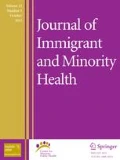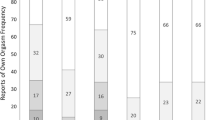Abstract
The Male Role Norms, Knowledge, Attitudes, and Perceptions associated with Colorectal Cancer Screening (MKAP-CRCS) survey was developed to assess the attitudes, knowledge, male role norms, perceived barriers, and perceived subjective norms associated with screening for colorectal cancer (CRC) among young adult African American men. There is a critical need for exploring the complex factors that may shape attitudes towards CRC screening among men who are younger (i.e., ages 19–45) than those traditionally assessed by clinicians and health promotion researchers (age 50 and older). Psychometrically sound measures are crucial for eliciting valid and reliable data on these factors. The current study, therefore, assessed the psychometric properties of the MKAP-CRCS instrument using an online sample of young adult African American men (N = 157) across the United States. Exploratory principal component factor analyses revealed that the MKAP-CRCS measure yielded construct valid and reliable scores, suggesting that the scale holds promise as an appropriate tool for assessing factors associated with CRC screening among younger African American men. Strengths and limitations of this study, along with directions for future research are discussed, including the need for more research examining the relationship between masculinity and CRC screening among African American men.
Similar content being viewed by others
References
American Cancer Society: Colorectal cancer facts & Figs. 2014–2016. http://www.cancer.org/acs/groups/content/documents/document/acspc-042280.pdf (2015).
American Cancer Society: Cancer facts & figures for African Americans 2016–2018. http://www.cancer.org/acs/groups/content/@editorial/documents/document/acspc-047403.pdf (2016).
Rawl SM, Menon U, Burness A, Breslau ES. Interventions to promote colorectal cancer screening: an integrative review. Nurs Outlook. 2012; 60:172–81.
Rogers CR, Goodson P. Male role norms, knowledge, attitudes, and perceptions of colorectal cancer screening among young adult African American men. Front Public Health. 2014;2(52):1–12. doi:10.3389/fpubh.2014.00252.
Ajzen I, Fishbein M. Understanding attitudes and predicting social behavior. Englewood Cliffs: Prentice Hall Publishing; 1980.
Levant RF, Hall RJ, Rankin TJ. Male role norms inventory-short form (MRNI-SF): development, confirmatory factor analytic investigation of structure, and measurement invariance across gender. J Couns Psychol. 2013;60(2):228–38.
Green PM, Kelly BA. Colorectal cancer knowledge, perceptions, and behaviors in African Americans. Cancer Nurs. 2004;27(3):206–15.
Agrawal S, Bhupinderjit A, Bhutani MS, Romero Y, Srinivasan R, Figueroa-Moseley C. Colorectal cancer in African Americans. Am J Gastroenterol. 2005;100(3):515–23.
Bailey CE, Hu CY, You YN, Bednarski BK, Rodriquez-Bigas MA, Skibber JM et al. Increasing disparities in the age-related incidences of colon and rectal cancers in the United States, 1975–2010. JAMA Surg. 2015;150(1):17–22.
Rex DK, Johnson DA, Anderson JC, Schoenfeld PS, Burke CA, Inadomi JM. American college of gastroenterology guidelines for colorectal cancer screening 2008. Am J Gastroenterol. 2009;104(3):739–50.
Levant R, Hirsch L, Celentano E, Cozza T, Hill S, MacEachern M, Marty N, Schnedeker J. The male role: an investigation of contemporary norms. J Ment Health Couns. 1992;14:325–37.
Levant RF, Rankin TJ, Williams C, Hasan NT, Smalley KB. Evaluation of the factor structure and construct validity of the male role norms inventory-revised (MRNI-R). Psychol Men Masc. 2010;11:25–37.
Thompson EH, Bennett KM. Measurement of masculinity ideologies. A (critical) review. Psychol Men Masc. 2015;16(2):115–33.
Rogers CR, Mitchell JA, Franta GJ, Foster MJ, Shires D. Masculinity, racism, social support, and colorectal cancer screening uptake among African American men: a systematic review. Am J Mens Health. 2015. doi:10.1177/1557988315611227.
Griffith DM, Johnson JL. Implications of racism for African-American men’s cancer risk, morbidity, and mortality. In: Treadwell HM, Xantos C, Holden KB, editors. Social determinants of health among African-American men. San Francisco: Jossey-Bass; 2013. pp. 21–38.
Acknowledgements
The authors extend gratitude to the participants who made the study possible.
Funding
The authors disclose receipt of funding for the study and/or authorship of this article: Dr. Charles Rogers’ work on this article was supported by the Transdisciplinary Center for Health Equity Research at Texas A&M University (TAMU), and the National Cancer Institute of the National Institutes of Health (NIH) under Award Number R25CA163184. Dr. Patricia Goodson received no financial support for the research and/or authorship of this article. O. Jessica Obidike’s work on this article was supported by the NIH under Award Number R25CA163184 and the Office for Business & Community Economic Development at the University of Minnesota (UMN). The content is solely the responsibility of the authors and does not necessarily represent the official views of the NIH, UMN, or TAMU.
Author information
Authors and Affiliations
Corresponding author
Ethics declarations
Conflict of interest
Dr. Charles Rogers declares he has no conflict of interest. Dr. Patricia Goodson declares she has no conflict of interest. Lastly, Ms. O. Jessica Obidike also declares she has no conflict of interest.
Ethical Approval
All procedures performed in this study involving human participants were in accordance with the ethical standards of the institutional and/or national research committee and with the 1964 Helsinki declaration and its later amendments or comparable ethical standards. As aforementioned in the Procedure section, informed consent was obtained from each participant prior to completing the survey.
Rights and permissions
About this article
Cite this article
Rogers, C.R., Goodson, P. & Obidike, O.J. Measuring Factors Associated with Colorectal Cancer Screening among Young Adult African American Men: A Psychometric Study. J Immigrant Minority Health 20, 101–106 (2018). https://doi.org/10.1007/s10903-016-0523-y
Published:
Issue Date:
DOI: https://doi.org/10.1007/s10903-016-0523-y



